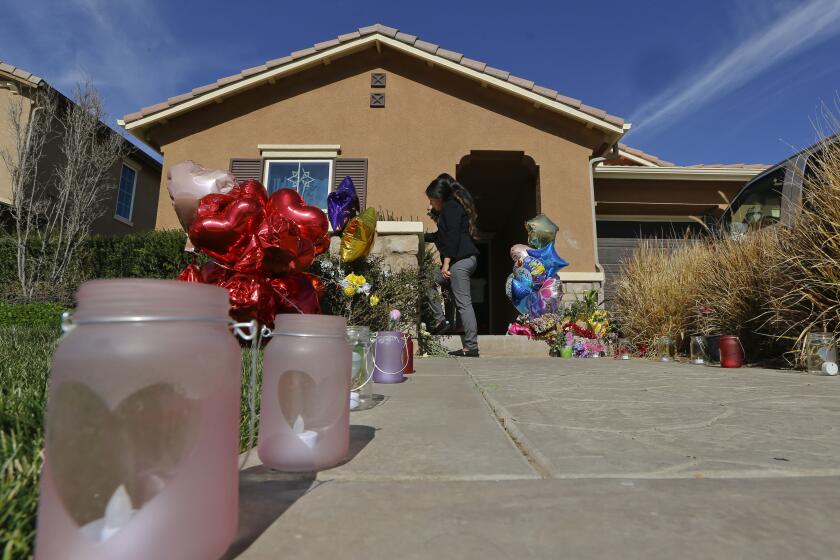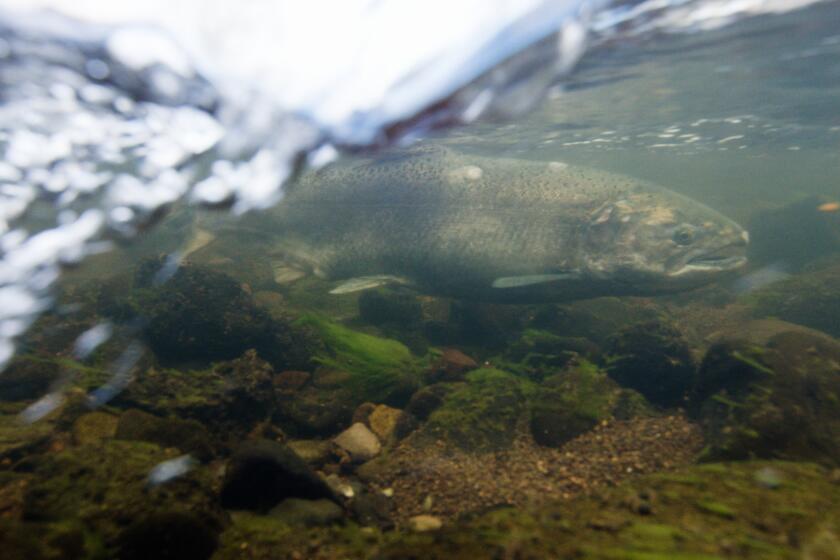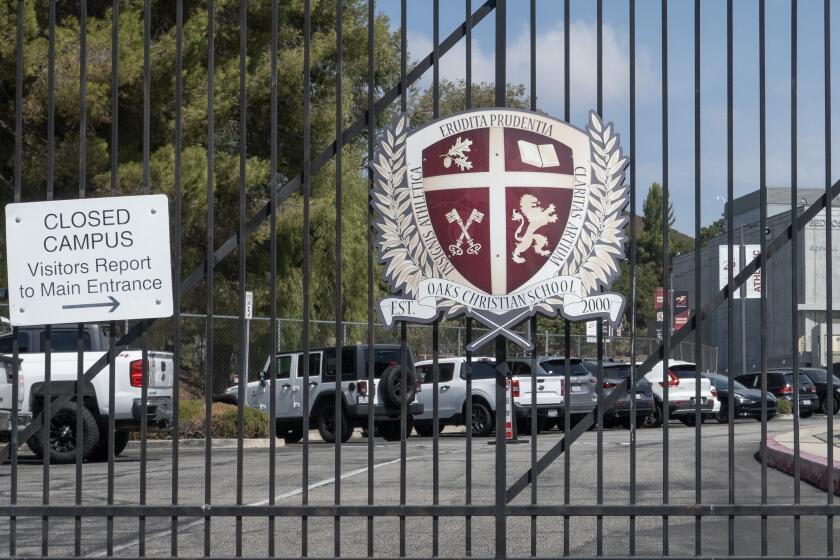Accord Lets Azusa Rock Stay Open, With Limits
In the end, it was the kind of truce that let none of the combatants claim a clear victory. A few called it defeat.
After months of legal and political saber-rattling among Azusa, neighboring Duarte and the Azusa Rock Co., a compromise negotiated by the three was approved by the Azusa City Council on Monday. It will allow the quarry company to continue mining Fish Canyon under 13 conditions designed to mitigate noise and dust pollution.
Tense Chapter Ends
Despite a unanimous recommendation from the Azusa Planning Commission in September that the city revoke the 32-year-old mining permit, the council voted 3 to 2 to accept the mitigation proposal, ending a tense chapter in relations between the cities. The proposal will limit where and when mining is done, redirect gravel truck traffic, limit blasting and give the city more control over the operation.
Duarte officials who attended the council meeting said they approved the compromise and will no longer press Azusa to revoke the quarry’s operating permit. Duarte and a group of Azusa residents had mounted a campaign to close the quarry nine months ago.
Fear of Lawsuit
Azusa officials, fearing a lawsuit from Azusa Rock or Duarte, had sought the compromise to allow mining of the 190-acre site but lessen its harmful impact. Azusa stood to lose an estimated $100,000 a year in taxes if the quarry was closed. As expected, the compromise received mixed reviews.
“I honestly believe mitigation addresses the concerns, giving a victory to all parties concerned,” said Azusa Councilman Tony D. Naranjo. It was Naranjo who first proposed in October that the city forgo spending $100,000 for environmental studies in favor of negotiations with Azusa Rock and Duarte.
But leaders of the Committee to Save the Foothills, an Azusa citizens group opposed to continued quarrying, blasted the compromise and said they are considering a legal challenge to the quarry.
“The compromise is meager, absolutely nothing,” said Carol Montano, a leader of the group. “As far as we’re concerned, the residents of Azusa have won zero.” The committee monitored the compromise negotiations but did not participate.
Azusa Rock President Tom Sheedy said he was relieved by the outcome. He said that while the compromise will make the quarry less profitable, it will allow the company to continue without the constant threat of closure.
“We gave away quite a bit,” he said. “But by the same token, we can’t stand being in court every couple of years. It’s a reasonable trade-off.”
Officials from Duarte, whose legal expenses may end up totaling $80,000 for consultants and fees, tried to put the best face on the outcome.
Duarte Mayor John Hitt denied a disappointed resident’s assessment that the city “drove 99 yards and punted.”
“Maybe we didn’t make a touchdown, but we got a field goal,” he said. “Our goal was always to alleviate the impact on our citizens. We feel we got 80 to 90% of what we started out for.
“Many people would see us as capitulating, when in reality,” Duarte got what it set out to accomplish, Hitt said.
Azusa council members Harry L. Stemrich and Jennie Avila along with Naranjo approved the compromise. Mayor Eugene F. Moses, who had earlier advocated that the city sue to close the quarry, and Councilman Bruce Latta voted against it.
But Latta, who in April asked the council to look into revoking the quarry’s permit, said it became obvious during the hearings that the council majority was not in favor of revocation.
“I didn’t see it getting revoked,” he said. “So, I think the mitigation measures were a good compromise.”
While acknowledging the environmental problems the quarry poses, Naranjo said the five months of Planning Commission hearings did not yield the evidence needed to justify revoking the firm’s permit to operate.
“In my opinion, evidence must be stronger to take vested rights from a property owner,” he said.
Naranjo blamed both Azusa and Duarte for allowing the conflict to begin. He said the 1956 Azusa City Council should never have allowed the quarry to open, while Duarte should not have built homes on Encanto Parkway, an established route for the quarry’s gravel trucks.
Under the compromise conditions, which the council will formalize in December, Azusa Rock has agreed to a series of measures that will reduce dust and noise pollution along Encanto Parkway that include:
Building a new quarry access road along the San Gabriel River bed east of Encanto Parkway within the next year. The road will be augmented by a conveyor belt system, which will transport Azusa Rock’s unprocessed material to the Owl Rock Co. in a processing arrangement worked out by the companies.
Army Corps Authority
The river bed is administered by the U.S. Army Corps of Engineers, and all construction would be subject to the federal government’s approval. Roy E. Bruckner, Azusa’s director of community development, said the Army has indicated a willingness to work with Azusa and the quarry company if all federal requirements are met.
Sheedy estimated that the conveyor belt and road would cost between $2 million and $4 million.
“That’s a pretty big spread, but we don’t know what all the conditions (imposed by the corps) are going to be.”
Limiting Azusa Rock’s use of Encanto Parkway, Fish Canyon Road and Todd Avenue to specific situations and providing for a $10,000 roadway maintenance fund to be established by the quarry. City officials said that once the riverway route is finished, there should be a sharp reduction in traffic on the other roads.
Limiting quarry hours to 6 a.m. to 10 p.m. daily, with no operations on Sunday and holidays. The quarry can now operate on holidays and Sundays.
Directing quarry activities to the west, making the quarrying less visible from the valley below. An 800-foot scar on the hillside will be replanted.
Requiring that all blasting be approved by the city and used “only as a last resort.”
Establishing a reclamation fund--2 cents per ton of rock mined--by Azusa Rock, to be administered by the city and the quarry. Sheedy estimated that the fund would eventually generate between $40,000 and $50,000 annually.
Azusa Rock has also agreed to cease all work outside its property, replant mined areas, water down all trucks and equipment to control dust, and conduct and adhere to a study on proper slope angle to prevent landslides. Azusa rock will also fence off areas being quarried, restore public access to Fish Canyon by opening trails through the quarry site and submit for city approval any enlargement of operations or significant change in the equipment being used.
Review in 2 Years
The amended permit is for 25 years, with a 25-year renewal if the city determines the quarry has shown “substantial compliance” with the conditions. The permit will also be reviewed every two years by the Planning Commission. The city can begin revocation proceedings if Azusa Rock defaults on the mitigation measures.
“I think we got some good concessions all the way around,” said Azusa City Administrator Julio J. Fuentes, who led the negotiations. “The bottom line is this: It’s going to make them an acceptable neighbor.”
Stemrich, responding to the Planning Commission’s findings that the quarry had violated permit conditions in the past, pledged to ensure that Azusa Rock complies with the compromise.
“If Azusa Rock does not follow the mitigation measures, then I guarantee they will be closed down,” he said.
In a related matter, the Duarte City Council voted Tuesday to ask a Superior Court judge to continue until January the city’s lawsuit against Azusa over its certification of Azusa Rock’s plan for reclamation of mined areas. Duarte officials indicated that once Azusa formally adopts the compromise conditions, the suit will be dropped.
More to Read
Sign up for Essential California
The most important California stories and recommendations in your inbox every morning.
You may occasionally receive promotional content from the Los Angeles Times.










